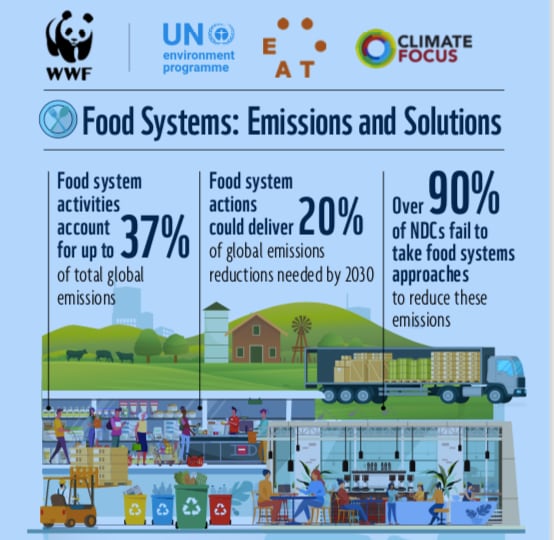The document, called Enhancing Nationally Determined Contributions (NDCs) for Food Systems, defines food systems as all elements related to the production, processing, distribution, preparation and consumption of food. It claims they account for up to 37% of all greenhouse gas emissions and that pursuing a business-as-usual trajectory would single-handedly exhaust the 1.5oC compatible emissions budgets for all sectors.
Diets, food loss and waste are widely ignored, according to the report. However, it argues by adding them to national climate plans, policymakers could improve their emissions mitigation and adaptation contributions from food systems by as much as 25%.
Under the 2015 Paris Agreement, countries are expected to revise or resubmit their NDCs every five years.
The report asserts 2020 offers policymakers the opportunity to adopt food systems solutions and set more ambitious targets and measures to cut greenhouse gas emissions and improve biodiversity, food security and public health.
Commitments
It claims that while 89% of NDCs mention agriculture production, agriculture emissions reduction targets are mainly included in wider land-use targets. It states other actions, such as reducing food loss and waste, or shifting to more sustainable diets, are widely ignored.
“Ambitious, time-bound and measurable commitments to food systems transformation are needed if we are to achieve a 1.5oC future,” said Marco Lambertini, Director General WWF-International.
“Failing to do so is ignoring one of the main drivers of today’s climate crisis.
“Without action on how we produce and consume food, we cannot achieve our climate or biodiversity goals, which are the foundation to achieve food security, prevent the emergence of diseases and ultimately deliver the Sustainable Development Goals.”
Inger Andersen, executive director of UNEP, said that the coronavirus pandemic has exposed the fragility of food supply systems.
Crisis
“This crisis offers us a chance to radically rethink how we produce and consume food,” said Anderson. “For example, reorienting consumption by halving food waste and catalysing a shift towards more plant-rich diets, is also a powerful climate mitigation tool to take advantage of.
“It is up to us to seize this opportunity and put sustainable food systems at the heart of the green recovery.”
The report has highlighted 16 actions that would help, including reducing land-use change and conversion of natural habitats, which could reduce emissions by 4.6 gigatonnes of carbon dioxide equivalent (Gt CO2e) annually.
Comparably, reducing food loss and waste, which accounts for 8% of all GHG emissions, could reduce emissions by 4.5 Gt CO2e per year, it claims.
Improving production methods and reducing methane emissions from livestock could reduce emissions by up to 1.44 Gt CO2e a year, it added. But it also reveals that much greater reductions could be achieved by shifting to healthier and more sustainable diets with a higher proportion of plant-based than animal-based foods.




